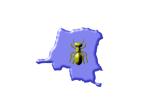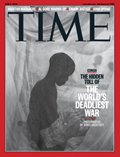pour la liberation du Congo

... is daily fare in the working world of international development. I recently had the mixed pleasure of dancing with the much feared and revered 'Lords of Poverty', that exclusive huddle of self-appointed delegates to the indigent of the earth, the World Bank. In the outsized excitement of the moment, my diminutive stature saw me trampled underfoot just as our two-stepping frenzy reached its climax. Me and the behemoth were not so well-suited as dancing partners, I learned to my brief-lived dismay.
The details of my two-stepping disaster are not worth relating, except that I shall never again work for the Lords of Poverty. No love lost there. But as I lay there squished like an ant, I considered not the gratuitous act of my squishing by World Bank heavies, whose aggression I still struggle to interpret. Instead, I considered my lowly status and what it could possibly mean to the cosmos--beyond the obvious fact of my being a meaningless ant.
Somehow, my mind drifted to the choice of symbol displayed on Jean-Pierre Bemba's MLC Party flag, seen above. The lone ant implies, one suspects, an ant colony : a unitary mass capable of mobilization in self defense, to secure territory, or to slay unsuspecting prey. The phrase 'hive mind' need not be derogatory, after all; it may spell the awakening of collective awareness about the shape of humane politics and the rule of law. Action in the collective interest, a rarity in African politics, is certainly what is needed to heal and guide Congo's fractured political landscape as election day approaches on July 30. "Vive les fourmis!" I imagined Bemba's political advisors to be fantasizing. Ants as the Congolese electorate: perhaps ants hold more political potential than typically thought to possess.
Plein aux aces
 I first met Bemba in 2004 at an anti-corruption conference organized by an American NGO I was working for at the time. As I shook his hand, I noted with disappointment that he was like everyone else I had ever met in Congo's political class: he refused to look me in the eye. I also noted that my head would fit into either of his massive bear claws, perhaps the source of my obvious insignificance in his eyes. Bemba is also an ultra-rich international businessman, and I'm a poor aid worker he would happily wipe his rear end with, given the chance. In any event, he didnt show me the respect befitting a fellow ant, nor did he inspire me to mobilize on his behalf. Instead I cursed and argued with his simian bodyguards when they tried to steal the crates of beer we provided for the conference reception.
I first met Bemba in 2004 at an anti-corruption conference organized by an American NGO I was working for at the time. As I shook his hand, I noted with disappointment that he was like everyone else I had ever met in Congo's political class: he refused to look me in the eye. I also noted that my head would fit into either of his massive bear claws, perhaps the source of my obvious insignificance in his eyes. Bemba is also an ultra-rich international businessman, and I'm a poor aid worker he would happily wipe his rear end with, given the chance. In any event, he didnt show me the respect befitting a fellow ant, nor did he inspire me to mobilize on his behalf. Instead I cursed and argued with his simian bodyguards when they tried to steal the crates of beer we provided for the conference reception.When I saw him again last month on the streets of Mbuji Mayi, capital of the scorching hot Kasai Oriental province, he was marching with his ant-like mass of supporters towards election day. I didnt hang around to hear his campaign speech from the stump, but I suspect it was the usual incantation of impossible promises at which Congolese politicians are so exceptionally skilled. What it no doubt consisted in was the distribution of countless 'envelopes' of hard cash, ostensibly to 'buy votes'. Our group did have a hearty chuckle as Bemba marched by, waving to the crowds, who responded with shouts of 'Mbongo ezo bima!' or 'Bust out the cash!'
Bemba responded by waiving presidentially and wiping more sweat from his brow. O the travails of an ultra-rich former warlord currently enjoying total impunity from war crimes committed by his troops both in the DRC and in the Central African Republic, where they were once dispatched to 'quell rebellion'. Instead they chose to massacre local civilians, raping scores of women and girls in the process, just as they did across Congolese territory throughout the war. Such is the sterling calibre of Congo's current offering of presidential candidates.
Contrary to popular Western thinking about African dysfunction, cash doesnt buy votes in Congo, or anywhere else in Africa. People may not be robots, but they do like free money. By contrast, money walks, talks and treads serious ground here in the US with our superhuman corps of lobbyists, able to leap tall buildings of soft-money legislation in a single bound.
The Congolese do love money, though. Whoa, especially that free money. Love to see it flowing through the streets, between hands and into pockets of all shapes and sizes. When it flows in the direction of the ants, even if only in the personification of big bucks Bemba, all the better. But Bemba wont get their vote with envelopes, and everyone knows it. Bemba still dishes it out, though, like all presidential candidates will, up until the votes are cast. Such is the force of tradition, I guess. Honest political talk is what the Congolese are really hungry for, but their politicians arent up to the task.
As an often cynical Africa observer, I'm cautiously optimistic about Congo's upcoming elections. Bemba's party is fracturing, with its 'best face forward', that of Bemba's adviser Olivier Kamitatu, having defected. One of Mobutu's sons is running, who, despite being famously rich and iconically good-looking, does not appear able to make an intelligent political comment. The other party leaders are waning in the public eye, for various reasons, generally relating to the fact that their leaders got rich off the backs of Congolese for too long. One wild card is Tshisekedi and the UDPS, the longtime 'opposition leader', who has now decided he will oppose the whole election process, a move of no political advantage to anyone, surely not his own.
 Joseph Kabila, the president of the current transitional government, will probably win. The international community appears to back him. The national honeymoon will last six to nine months. By which time, if little or nothing has changed, popular unrest will raise the temperature a few degrees. If the military havent been paid either, the proverbial shit will hit the proverbial fan. An unstable Congo will continue to drag its neighbors into the mire, and further undermine Central Africa's potential to become an economic powerhouse capable of leading development across the continent.
Joseph Kabila, the president of the current transitional government, will probably win. The international community appears to back him. The national honeymoon will last six to nine months. By which time, if little or nothing has changed, popular unrest will raise the temperature a few degrees. If the military havent been paid either, the proverbial shit will hit the proverbial fan. An unstable Congo will continue to drag its neighbors into the mire, and further undermine Central Africa's potential to become an economic powerhouse capable of leading development across the continent.Elections could go terribly wrong, of course, triggering new waves of ethnic and political violence. If so, the vultures who made mountains of cash from the last ten years of chaos, Bemba foremost among them, will be back at the familiar trough of illicit arms deals and unregulated mineral extraction. This time, as before, there will be no one to stop them. Not the UN with its unenforced arms embargoes, not neighboring states who feed unfettered on Congo's vast resources, and certainly not the Lords of Poverty who despite spending millions in support of Congo's transition to stability are evacuating pre-emptively during the election period. How's that for a show of support from the international community?
 Amazingly, the normally anodyne Time magazine (US version) reported with surprising insight on Congo's "Deadliest War in the World" for its June 6 issue. The article is worth reading in its entirety , but this outtake encapsulates Congo's hope, tragedy, and our regretful status as unmoved onlookers:
Amazingly, the normally anodyne Time magazine (US version) reported with surprising insight on Congo's "Deadliest War in the World" for its June 6 issue. The article is worth reading in its entirety , but this outtake encapsulates Congo's hope, tragedy, and our regretful status as unmoved onlookers:"The shame of [international] indifference should be reason enough for action. But without more money from the developed world to help rebuild, without more troops to secure the peace and protect innocent civilians, without a genuine effort by Congo's leaders to work for the country rather than just their part of it and without Congo's neighbors ending their meddlesome ways, Africa's broken heart is unlikely to heal. In 10 years' time, you may be reading another story much like this one. The only difference will be that millions more people will have died."
1 comment:
Great article as for me. It would be great to read more about that matter.
BTW check the design I've made myself Overnight escorts
Post a Comment